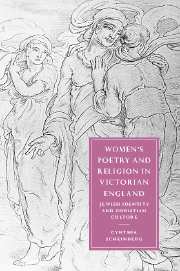Book contents
- Frontmatter
- Contents
- Acknowledgments
- 1 Introduction
- 2 “Sweet singers of Israel”: gendered and Jewish otherness in Victorian poetics
- 3 Elizabeth Barrett Browning and the “Hebraic monster”
- 4 Christina Rossetti and the Hebraic goblins of the Jewish Scriptures
- 5 “Judaism rightly reverenced”: Grace Aguilar's theological poetics
- 6 Amy Levy and the accents of minor(ity) poetry
- Notes
- Bibliography
- Index
- CAMBRIDGE STUDIES IN NINETEENTH-CENTURY LITERATURE AND CULTURE
6 - Amy Levy and the accents of minor(ity) poetry
Published online by Cambridge University Press: 22 September 2009
- Frontmatter
- Contents
- Acknowledgments
- 1 Introduction
- 2 “Sweet singers of Israel”: gendered and Jewish otherness in Victorian poetics
- 3 Elizabeth Barrett Browning and the “Hebraic monster”
- 4 Christina Rossetti and the Hebraic goblins of the Jewish Scriptures
- 5 “Judaism rightly reverenced”: Grace Aguilar's theological poetics
- 6 Amy Levy and the accents of minor(ity) poetry
- Notes
- Bibliography
- Index
- CAMBRIDGE STUDIES IN NINETEENTH-CENTURY LITERATURE AND CULTURE
Summary
“Nothing,” he said presently, “can alter the relations of things – their permanent, essential relations … ‘They shall know, they shall understand, they shall feel what I am.’ That is what I used to say to myself in the old days. I suppose, now, ‘they’ do know, more or less, and what of that?”
(Amy Levy, “Cohen of Trinity”)Song nor sonnet for you I've penned,
Nor passionate paced by your home's wide wall;
I have brought you never a flow'r, my friend,
Never a tear for your sake let fall.
And yet – and yet – ah, who understands?
We men and women are complex things!
A hundred tunes Fate's inexorable hands
May play on the sensitive soul-strings.
Webs of strange patterns we weave (each owns)
From colour and sound; and like unto these,
Soul has its tones and its semitones,
Mind has its major and minor keys.
(Amy Levy, “In a Minor Key,” lines 29–40)Amy Levy (1861–89) was, up until the early 1990s, almost a “lost” figure in British literary history. Today, she is gaining an increasing amount of critical attention, both for her fiction and her poetry. Today, she is gaining an increasing amount of critical attention, both for her fiction and her poetry. The reasons for Levy's critical resurrection are multiple; perhaps the most important event in her recent critical heritage was the 1993 publication of her selected writings, edited by Melvyn New, a volumewhich gave contemporary scholars access to Levy's writing from all genres, and Linda Hunt Beckman's 2000 publication of Amy Levy: Her Life and Letters.
- Type
- Chapter
- Information
- Women's Poetry and Religion in Victorian EnglandJewish Identity and Christian Culture, pp. 190 - 237Publisher: Cambridge University PressPrint publication year: 2002
- 1
- Cited by



